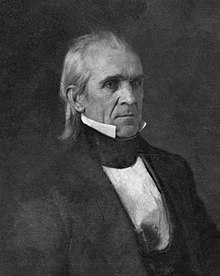

President of the United States
James Knox Polk November 2, 1795 Pineville, North Carolina, U.S.
June 15, 1849(1849-06-15) (53) Nashville, Tennessee, U.S.
March 4, 1845 – March 4, 1849
11th president of the United States (1845–49) "James Polk" and "James Knox Polk" redirect here. For other people with the same name, see James Polk (disambiguation). James K. PolkPortrait by Mathew Brady, c. 184911th President of the United StatesIn office March 4, 1845 – March 4, 1849Vice President George M. DallasPreceded by John TylerSucceeded by Zachary Taylor9th Governor of TennesseeIn office October 14, 1839 – October 15, 1841Preceded by Newton CannonSucceeded by James C. Jones13th Speaker of the United States House of RepresentativesIn office December 7, 1835 – March 3, 1839PresidentAndrew Jackson Martin Van BurenPreceded by John BellSucceeded by Robert M. T. HunterChair of the House Ways and Means CommitteeIn office March 4, 1833 – March 4, 1835Preceded by Gulian VerplanckSucceeded by Churchill CambrelengMember of the U.S. House of Representatives from TennesseeIn office March 4, 1825 – March 3, 1839Preceded by John Alexander CockeSucceeded by Harvey Magee WattersonConstituency6th district (1833–1839) 9th district (1825–1833) Personal detailsBornJames Knox Polk (1795-11-02 ) November 2, 1795 Pineville, North Carolina, U.S.DiedJune 15, 1849(1849-06-15) (aged 53) Nashville, Tennessee, U.S.Cause of deathCholeraResting placeTennessee State CapitolPolitical partyDemocraticSpouse(s)Sarah Childress (m. 1824 )Parents Samuel Polk Jane Knox EducationUniversity of North Carolina at Chapel Hill (BA)OccupationPoliticianlawyerSignatureNickname(s)Young HickoryNapoleon of the Stump James Knox Polk (November 2, 1795 – June 15, 1849) was the 11th president of the United States, serving from 1845 to 1849. He previously was the Speaker of the House of Representatives (1835–1839) and Governor of Tennessee (1839–1841). A protégé of Andrew Jackson, he was a member of the Democratic Party and an advocate of Jacksonian democracy. Polk is chiefly known for extending the territory of the United States through the Mexican–American War; during his presidency, the United States expanded significantly with the annexation of the Republic of Texas, the Oregon Territory, and the Mexican Cession following the American victory in the Mexican–American War. After building a successful law practice in Tennessee, Polk was elected to the state legislature in 1823 and then to the United States House of Representatives in 1825, becoming a strong supporter of Andrew Jackson. After serving as chairman of the Ways and Means Committee, he became Speaker of the House in 1835, the only president to have been speaker. Polk left Congress to run for governor of Tennessee; he won in 1839 but lost in 1841 and 1843. He was a dark horse candidate for the Democratic nomination for president in 1844; he entered his party's convention as a potential nominee for vice president but emerged as a compromise to head the ticket when no presidential candidate could secure the necessary two-thirds majority. In the general election, Polk defeated Henry Clay of the rival Whig Party. Historians have praised Polk for having met during his four-year term every major domestic and foreign policy goal he had set. After a negotiation fraught with the risk of war, he reached a settlement with Great Britain over the disputed Oregon Country, the territory, for the most part, being divided along the 49th parallel. He provoked a war with Mexico in an attempt to expand the nation and succeeded in doing so, as it resulted in Mexico's cession of nearly all the American Southwest. He secured a substantial reduction of tariff rates with the Walker tariff of 1846. The same year, he achieved his other major goal, re-establishment of the Independent Treasury system. True to his campaign pledge to serve only one term, Polk left office in 1849 and returned to Tennessee, where he died three months after leaving the White House. Though relatively obscure today, scholars have ranked Polk favorably for his ability to promote and achieve the major items on his presidential agenda, despite limiting himself to a single term. He has also been criticized for leading the country into an aggressive war against Mexico and thus exacerbating divides between free and slave states. A property owner who used slave labor for most of his adult life, he kept a plantation in Mississippi and increased his slave ownership while president. The legacy of Polk's presidency of territorial expansion – with the United States reaching the Pacific coast and, roughly, its present contiguous borders – was a nation poised to become a world power, but with sectional divisions gravely exacerbated, setting the stage for the Civil War.

We use cookies
We use cookies and other tracking technologies to improve your browsing experience on our website, to show you personalized content and targeted ads, to analyze our website traffic, and to understand where our visitors are coming from. Privacy Policy.